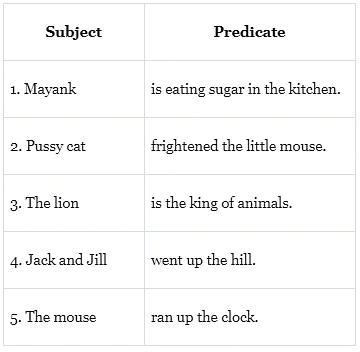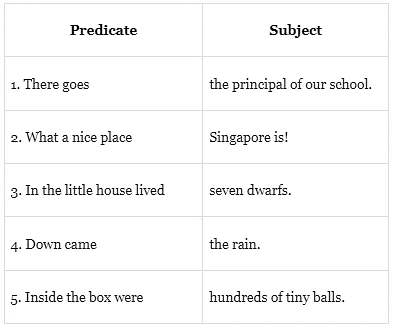The Sentence | English Grammar Class 5 PDF Download
| Table of contents |

|
| Important Terms for Sentence |

|
| Subject and Predicate |

|
| Kinds of Sentences |

|
| Transformation of Sentences |

|
Important Terms for Sentence
- A sentence always begins with a capital letter.
- The words of a sentence are placed in a proper order.
- There must be a verb in a sentence.
- A sentence always ends with a full stop, a question mark, or an exclamation mark.
Read the following group of words:
- Sings well very Supriya
- A fruit mango is a
- Play ball with children
- Rails the train on runs
These groups of words do not make any sense. Therefore, they are not sentences.
They will make sense only when arranged in a proper order, as:
- Supriya sings well.
- A mango is a fruit.
- Children play with ball.
- The train runs on rails.
These groups of words make sense and they are giving some meaning, so they are sentences.
Subject and Predicate
Read the following groups of words:
- of gold
- the new pen
- to my door
- dancing birds
- in the west
These groups of words do not make complete sense. They are phrases and not sentences. They do not have a subject or a predicate. A sentence must have a subject about whom we speak, and a predicate what we speak. Thus a sentence should have two parts—a Subject and a Predicate.
What is Subject?
The subject is that part of a sentence which names the person, place, thing or idea that is doing something. The subject are generally nouns, pronouns, determiners or adjectives.
For example:
- The postman brings letters for us.
- Amit and Rajesh are friends.
- She is a beautiful lady.
Example of Subject

Subject of a sentence usually comes before the predicate, but sometimes the subject is put after the predicate.
What is Predicate?
The predicate is that part of a sentence that tells something about the subject. This is the remaining part of the sentence after subject.
For example:
- Gopal is reading a novel.
- Ragini is a good dancer.
- The dog is a faithful animal.
Examples of Predicate

Kinds of Sentences
Sentences are of five kinds according to their meaning and purpose:
1. Assertive Sentence
An Assertive Sentence is a sentence which makes a statement or an assertion. An assertive sentence ends with a full stop.
For example:
- Rana is a good boy.
- Rana reads in class V.
2. Interrogative Sentence
An Interrogative Sentence is a sentence that asks question. Interrogative sentences end with a question mark.
For example:
- Where are your glasses?
- Why are you standing here?
3. Imperative Sentence
An Imperative Sentence is a sentence that expresses a command or a request. Imperative sentences end with a full stop.
For example:
- Johnny! Open your mouth! (Command)
- Please lend me your book. (Request)
4. An Exclamatory Sentence
An Exclamatory Sentence is a sentence that expresses a strong feeling or sudden remark. Exclamatory sentences end with an exclamation mark.
For example:
- How naughty your brother is!
- How I wonder what you are!
5. Optative Sentence
An optative sentence makes a prayer, a wish or a desire. Optative sentences end with a full stop or an exclamation mark.
For example:
- May you win the match! (prayer)
- Would that I was the Prime Minister! (wish)
Note: From the above sentences it is clear that:
Every sentence begins with a Capital Letter.
Every Assertive or Imperative Sentence ends with a Full Stop (.).
Every Interrogative Sentence ends with a Question Mark (?).
Every Exclamatory Sentence ends with an Exclamation Mark (!)
Every Operative Sentence ends with full stop (.) or an Exclamation Mark (!)
Transformation of Sentences
A sentence can be changed from one kind to another without changing its meaning.
1. From Exclamatory to DeclarativeAn exclamatory sentence can be changed into a declarative sentence and vice versa.
Example:
- What an amazing scenery (it is)! (exclamatory)
- It is an amazing scenery. (declarative)
2. From Declarative to Interrogative
A declarative sentence can be changed into an interrogative sentence by putting the verb before the subject.
Example:
- She is very kind. (declarative)
- Isn’t she very kind? (interrogative)
Note: In order not to change the meaning, use “Isn’t”, “Aren’t”, “Hasn’t” and “Won’t”.
When a declarative sentence has two verbs-one helping and one main, it can be changed into an interrogative sentence by putting the subject between the two verbs.
Example:
- She has finished her homework. (declarative)
- Hasn’t she finished her homework? (interrogative)
When a declarative sentence contains the adverb never, it becomes ever in the interrogative sentence.
Example:
- I never asked you to do it. (declarative)
- Did I ever ask you to do it? (interrogative)
When a declarative sentence contains the adverb no, it becomes any in the interrogative sentence.
Example:
- There is no fun in doing that. (declarative)
- Is there any fun in doing that? (interrogative)
|
37 videos|525 docs|53 tests
|
FAQs on The Sentence - English Grammar Class 5
| 1. What is the difference between a subject and a predicate in a sentence? |  |
| 2. What are the different kinds of sentences? |  |
| 3. How can a sentence be transformed? |  |
| 4. How can one identify the subject and predicate in a sentence? |  |
| 5. Why is it important to understand the different components of a sentence? |  |





















